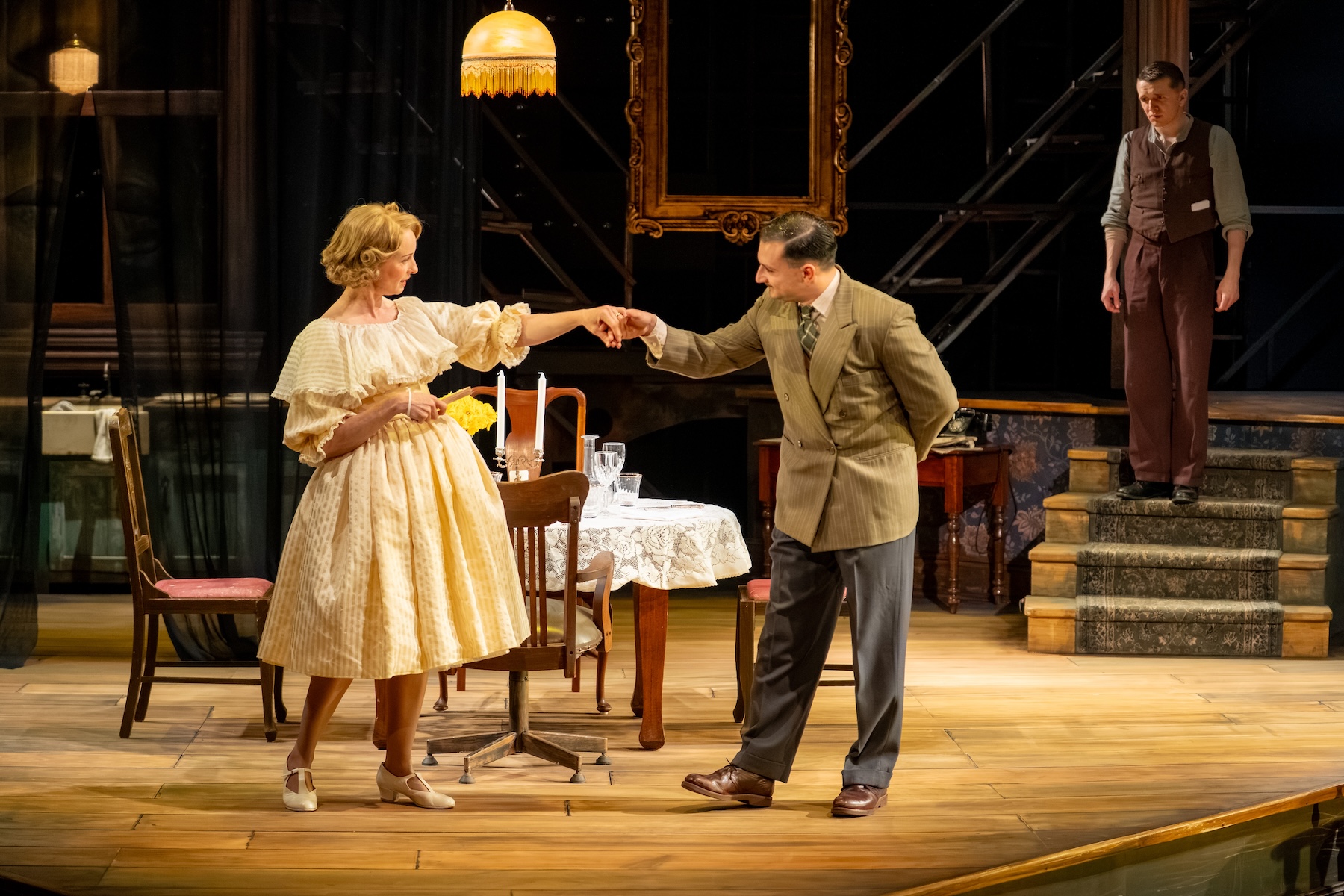Theatre review: The Glass Menagerie
State Theatre Company South Australia takes on the quiet play that propelled Tennessee Williams into stardom, bringing this intimate, semi-autobiographical story to the stage with tenderness and some exceptional performances.

A menagerie is a place where wild or foreign animals are held captive, usually for exhibition. And so the story of Tom Wingfield’s claustrophobic home space with his mother and sister unfolds, where we are the overt audience welcomed by Tom, who also acts as narrator and presumed playwright, the fourth wall busted from the opening line: ‘This play is a memory,’ and indeed it is.
Premiering in 1944, The Glass Menagerie was Tennessee Williams’ eighteenth play, and its success would be the turning point in his career. Tom is a fictionalised version of Williams, just as Williams’ mother is the melodramatic Amanda Wingfield, and Williams’ sister is Laura. Together they live in St Louis, Missouri, where Tom works in a shoe warehouse to keep a roof over their heads. His mother is an over-the-top drama queen and his sister is odd, though they call her ‘shy’ – it’s likely she’s neurodivergent, but who would’ve known what that meant in 1930, when the play is set?
Tom goes to the movies as much as possible; he can’t have adventures of his own so he might as well watch other people having them. When he’s the playwright, he’s in the background, watching the story develop and taking notes. When he’s the narrator, he tells the story of this time in his life with a warm smile on his face, countering the sheer exasperation he presents as Tom, the character. Mostly his character has had it with his mother, who can’t be satisfied and continually repeats stories of all the many suiters she had down south, back in the day, before she met their father who left them years earlier and is only present through an image on a floor-to-ceiling sheer curtain separating the kitchen from the dining room. His is a ghostly presence, a reminder of someone who was never really a part of the family. Meanwhile, Laura tends to her animals, a collection of tiny glass figurines that seem to speak to her and make her laugh. Tom is never upset with Laura. In fact, she’s likely the reason he won’t run away.

William’s sister, Rose – Laura’s nickname in the play is Blue Rose – is said to have had schizophrenia, and Williams fronted the bill for her lifelong institutionalisation following a devastating partial lobotomy. The play comes across as an apology to Rose because he did leave, and thankfully so, as Tennessee Williams is one of the world’s greatest playwrights to have ever lived. The Glass Menagerie was first staged a year after Rose’s lobotomy.
Laurence Boxhall (who recently appeared as Gollum in the Australian run of The Lord of the Rings: a musical tale) plays an accent-perfect Tom, who shines when he’s narrating in a personal ode to his sister. Ksenja Logos (The Dictionary of Lost Words) seems to enjoy herself immensely, and why wouldn’t she? Amanda Wingfield is an enormous character with many layers, most of which keep us laughing. Though would her character have been as funny in the mid-1940s? Here we are, a modern-day audience, not really gelling with the difficulty of being a single parent who hasn’t the means to go out and get a job because society forbade it, and really did need to depend on her son to make the money, and on her daughter to find a husband so that she doesn’t land herself in the same situation.
Kathryn Adams (Welcome to Your New Life) is a fragile, gentle and quirky Laura, and we feel this through her facial expressions as much as hear it in her words. Adelaide-born filmmaker Jono Darby is a charmingly believable Jim, the friend Tom brought home at his mother’s request to find Laura a husband. The acting, truly, is all-around exceptional.
Subscribe for updates
Mark Thompson’s set is remarkably placed with gorgeously worn floorboards, antique flowered couch and plush-upholstered dining chairs, and what looks to be stencilled lino surrounding the stage. There’s a terrace attached to the fire escape, where Tom goes to smoke and look out to the rest of the world, where his dreams lie. There is no set change, and this responds well to the subtle, domestic nature of the play’s telling.
Williams – whose other plays include Cat on a Hot Tin Roof and A Streetcar Named Desire – tends to bring people together so they can fall apart, and under the direction of Shannon Rush, this is done with tenderness. How often are we given the opportunity to witness a story about a brother loving and losing his sister? The sibling dynamic is rarely explored in this way, and to my thinking, it’s not only emotional, it’s exemplary.
Well done to the State Theatre for gifting us with this play, choosing solid and sensitive storytelling over big plot, political statement and shiny stage and costume design. It’s so comforting to get back to the less-is-more mentality.
The Glass Menagerie continues at The Odeon Theatre until December 7
Free to share
This article may be shared online or in print under a Creative Commons licence

